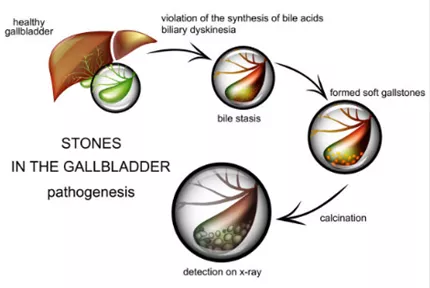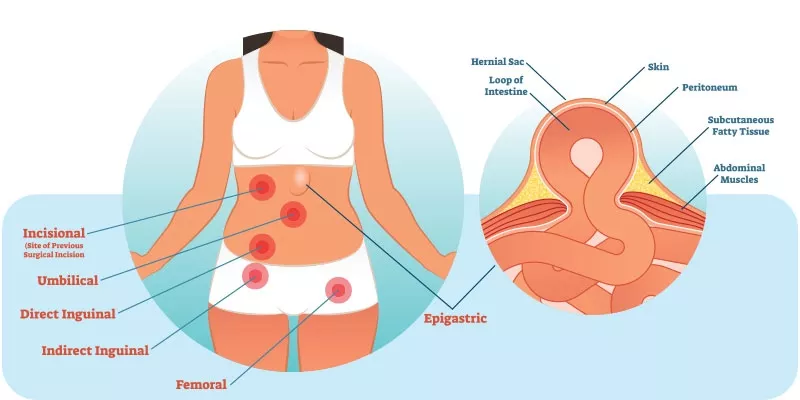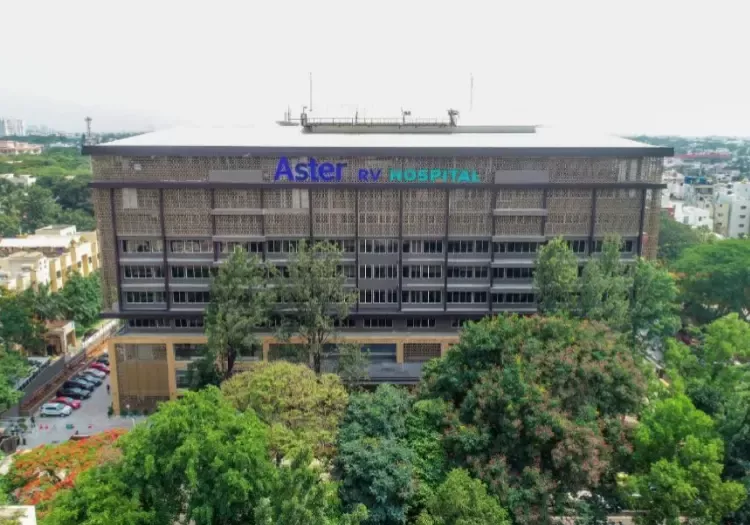Overview
Gallbladder stone and Hernia are the most common problem in general Population. Gallbladder stones has a severe pain in upper stomach can spread to shoulder and stomach, It can also cause vomiting and fever. Hernias are visible bulge in the umbilical or groin regions. Hernias are worsened with physical activities. Both these conditions require immediate treatment.
There are two main types of gallstones: cholesterol stones and pigment stones. Cholesterol stones are the most common type. Most people with gallstones don't have any symptoms. However, if a gallstone blocks the bile duct, it can cause pain, nausea, vomiting, and fever. In some cases, a blocked bile duct can lead to serious complications, such as:
Gallstone colic: Severe pain in the upper abdomen or right side, often triggered by fatty meals.
Acute cholecystitis: Inflammation of the gallbladder due to gallstone blockage, causing severe pain, fever, and other symptoms.
Choledocholithiasis: Gallstones move into the bile ducts, leading to jaundice, pancreatitis, and abdominal pain.
Treatment for gallstones depends on the severity of symptoms. If gallstones are causing problems, the gallbladder may be removed (cholecystectomy). This can be done using minimally invasive techniques.
What are the symptoms of Gall Bladder?
• Abdominal pain, particularly in the upper right portion of the abdomen
• Pain that worsens after eating, especially fatty or greasy foods
• Nausea and vomiting
• Back pain, specifically between the shoulder blades
• Bloating and indigestion
• Belching or flatulence
• Yellowing of the skin or eyes (jaundice) in severe cases
• Clay-colored stools
The most common types of Hernia are:
Inguinal hernia: This happens when a part of the intestine pushes through the inguinal canal in the groin area. It's more common in men.
Femoral hernia: This is similar to an inguinal hernia, but it happens in the upper thigh, near the groin.
Umbilical hernia: This happens when tissue protrudes through the abdominal wall near the belly button. It's common in infants and pregnant women.
Incisional hernia: This happens at the site of a previous surgical incision, where the abdominal tissue pushes through the weakened scar tissue.
Treatment for hernias usually involves surgery to repair the weakened tissue. The surgeon will use sutures or synthetic mesh to prevent the organ or tissue from pushing through again.
If hernia surgery is not done promptly, there can be complications. The hernia can grow larger, become more uncomfortable, and cause increasing pain. In some cases, the trapped tissue or organs may get squeezed and cause serious problems such as blockages or damage. It is important to address a hernia promptly to avoid these potential complications.
What are the symptoms of Hernia?
• Visible bulge or swelling in the affected area, such as the groin, abdomen, or thigh
• Discomfort or pain at the site of the bulge, especially during physical activity or lifting
• Heaviness or aching sensation in the affected area
• Burning or sharp pain at the site of the bulge
• Feeling of weakness or pressure in the abdomen or groin
• Nausea or vomiting, particularly if the hernia becomes incarcerated or strangulated (a medical emergency)


Treatment Process
If you are experiencing any of the symptoms mentioned above, have been recommended surgery by your primary care doctor, or are seeking a second opinion, you may be interested in learning more about your experience at Aster RV Hospital.
Here's a quick overview of the treatment process:
You will visit the emergency department or outpatient clinic. Our experienced doctors will evaluate your symptoms and order tests, such as blood tests, ultrasound, or CT scan(s) to diagnose gallstone(s) or hernia(s).
If gallstones or hernia is confirmed, you will be referred to a surgeon for further evaluation and treatment. Our specialists will discuss your treatment options with you and recommend the best course of action for your medical condition.
If you choose to have surgery, our surgeons will perform the procedure laparoscopically, which is a minimally invasive procedure. This means that you will have only small incisions in your abdomen, and you will typically be able to go home within one to two days.
After surgery, you will stay in the hospital for one to two days for monitoring and care. You will then be able to go home to rest and recover.
You will need to follow up with your doctor for regular checkups. This will ensure that your recovery is going well and that there are no complications.
Knowing your Surgical Procedures:
Cholecystectomy is a surgery to remove the gallbladder. Gallstones are hard deposits that can form in the gallbladder. If gallstones cause pain or inflammation, the gallbladder may need to be removed.
There are two types of cholecystectomy:
Laparoscopic cholecystectomy: This is a minimally invasive surgery that is done through small incisions in the abdomen. A camera is inserted into one of the incisions to guide the surgeon. The gallbladder is then removed through one of the incisions.
Open cholecystectomy: This is a traditional surgery that is done through a larger incision in the abdomen. The gallbladder is then removed through the incision can be done using open surgery or minimally invasive laparoscopic techniques.
Open surgery is the traditional way to do herniorrhaphy. It involves making a larger incision in the abdomen. Laparoscopic herniorrhaphy is a newer technique that uses smaller incisions and a camera to guide the surgeon.
Laparoscopic herniorrhaphy is typically associated with a shorter recovery time and fewer complications than open surgery.
The type of herniorrhaphy that is best for you will depend on the type and location of your hernia.
Gallstone surgery is usually advised when patients experience recurring or intense pain from gallstones, suffer from gallbladder inflammation (cholecystitis), or face complications like pancreatitis due to gallstones.
Hernia surgery is usually considered for patients experiencing discomfort, pain, or other issues caused by a hernia. Additionally, patients with a hernia at risk of strangulation, where the blood supply to the herniated tissue is cut off, may also require surgery.
Hernia surgery can be either an outpatient or inpatient procedure. The decision depends on factors such as hernia size, severity, overall health, and surgeon's preference.
After gallstone and hernia surgeries, patients should consider the following precautions:
- Wearing a compression garment for incision support
- Avoiding heavy lifting
- Maintaining a healthy diet as recommended by your doctor
- Getting ample rest
- Following the prescribed pain medication
- Attending follow-up appointments with the doctor
Yes, gallstone surgery and hernia surgery can be performed together in a procedure called concurrent surgery. This can be a good option for patients who want to avoid having two separate surgeries. However, there are some risks associated with concurrent surgery, such as an increased risk of infection and complications. The decision of whether or not to have concurrent surgery is a personal one that should be made between the patient and their doctor.
Yes, As stones can recess. Complications are high if we retain Gallbladder and uterus negligible.
No, As recessive is very high. Gallbladder is removed totally.
No, However surgery may not be required in all cases
Potential risks associated with gallstone and hernia surgeries include:
- Infection
- Bleeding
- Anesthesia complications
- Injury to surrounding structures
- Possibility of gallstone or hernia recurrence
-All Complications are minimal in expectation.



